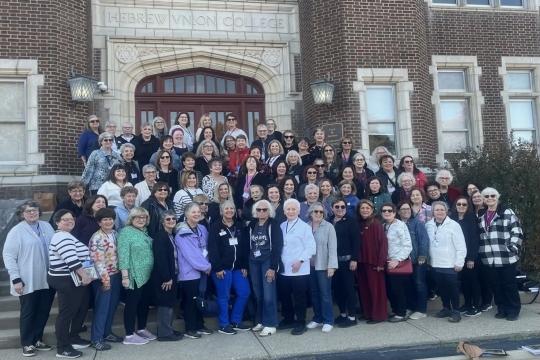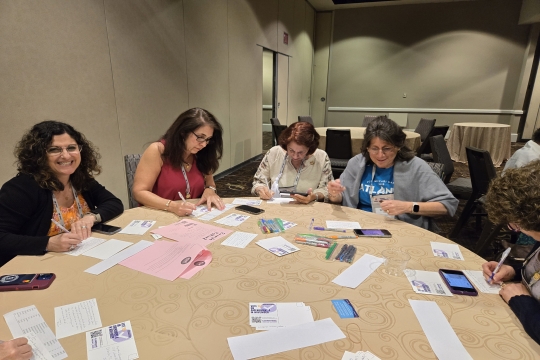Several weeks ago, I was asked to write something for this blog about a program called ‘Celebrating the Mothers of Israel,’ which would have been cool, but we hadn’t in fact had a program with that name. We have, however, had a Women’s Seder with that title and after consultation with WRJ Marketing and Communications Associate Gracie Cohen, that’s what I’m going to write about.
Before I start, a little history. We’ve had many women’s seders at Temple Sholom, Vancouver, BC over the years, and, and it’s always been a joyful, and meaningful event. It’s been my baby since 2016, aside from the COVID years, of course, and I like keeping things simple. However, I also feel it’s important that we make things interesting which meant not doing exactly the same thing year after year. In 2016, our seder committee came up with a plan. We created a Haggadah that we changed minimally for each seder. So, every year we would choose a theme and develop a revised Haggadah.. In each version, we would keep key elements, but also add or change readings as appropriate. Most importantly, we decided that we would dedicate each of the four cups of wine that we drink during the seder to a woman who had made a contribution linked to the theme.
The event itself is catered. One of our original committee members, who is somewhat older, – my age in fact – pointed out that many women have never really been able to enjoy a seder from start to finish because they had to deal with the brisket, or the carrots and our women’s seder should allow us to ‘recline.’ And we do. Usually around 50 of us gather around a long festive table with flowers, tambourines, wine, seder plates, etc. All set up by a team of ten or so volunteers. We have a song leader and each year a different, engaging Sisterhood member leads the seder. We discuss and laugh a lot.
Over the years, we have made some changes to the core elements of the Haggadah. As is true of most Jewish communities around the world, our membership comes from all parts of the world. In order to reflect that, we have begun including Sephardic and Mizrahi elements in our seder celebration, which previously had been classically Ashkenazi in its format. We added a wonderful cooked fruit charoset in addition to our usual apples and nuts. Instead of the Birkat Hamazon, we sing “Bendigamous al Altisimo” and just before we begin to tell the story of the Exodus, we join our song leader in a gorgeous song, Bivhilu Yatzanu, and several of us pass the seder plates over the heads of our participants. Finally, and hilariously, we beat each other over the head with green onions during the singing of Dayenu. For several of our non-Ashkenazi members, these changes were immensely meaningful, as well as being enriching for the rest of us,
So, a successful program. However, in 2023, we were struggling. That was the year Israel turned 75, and clearly, it needed to figure in our theme, but it was also the year of much turmoil in Israel with suppression of individual rights and the government threatening major changes in the legal system. It was difficult to feel joyous and celebratory.
This is when a committee is so helpful. I’m not sure I could have dealt well with this conundrum on my own, but group brainstorming resulted in an excellent solution. We might not feel celebratory about Israel’s circumstances at that moment, but we could, without hesitation, celebrate those women who had helped birth the country – the Mothers of Israel. We went looking. And we found several wonderful examples: Golda Meir, of course; but also, Miriam Ben-Porat known as the watch dog of Israel’s democracy, the first woman on Israel’s supreme court, as well as a defender of civil liberties and human rights; Alice Shalvi, feminist activist and educator who dedicated herself to educating Haredi women as well as championing inclusion, refugees and marginalized groups; finally, Zelda Schneurson Mishkovsky, activist and poet laureate, whose profoundly moving poem, “Each Person has a Name,” is read every year during Holocaust Remembrance Day in Israel.
It worked. Together we overcame the problems and had a wonderful women’s seder in 2023. We did, of course, find a theme for this year's seder. This time with the help of our wonderful rabbi, Rabbi Brown. The theme and title of our Haggadah is: Moving Forward with Hope. Rabbi Brown also suggested four women that we could honor. Each one is leading the way to a better outcome rather than the tragedy we are watching unfold. They are: Peace worker Vivian Silver who was killed October 7; Rachel Edry from Ofakim who was taken hostage October 7, and connected with the captors to ameliorate the situation; Rachel Goldberg, mother of hostage Hersh Polin-Goldberg, who is not allowing the world to forget the hostages, and Dr. Anna Harwood-Gross, who is providing training for therapists who are helping the hundreds of thousands of Israelis who are in distress.
Check out WRJ's special Haggadah insert you can use at your seder!
Related Posts

Falling in Love with Judaism

Heart to Heart & Face to Face


